Martin Barre wurde lange Zeit unterbewertet. Erst im Laufe der Jahre haben Kritiker und Fans gemerkt, welch brillanter Musiker er ist. Sicherlich lag es daran, dass er bei der Gruppe Jethro Tull im Schatten von Ian Anderson stand, dem charismatischen Kopf der Band. Aber ohne ihn, darin sind sich die Kenner einig, hätte es Jethro Tull in dieser Form bis heute nie gegeben.
Legendär ist sein Gitarrensolo auf dem Stück „Aqualung“, dass er im Studio ‚in einem Stück’ eingespielt hat. Dieses Solo wird inzwischen zu den zehn besten in der Rockszene gerechnet. Anerkennung, die mehr als berechtigt ist.
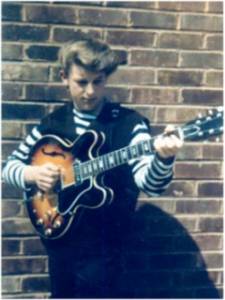 |
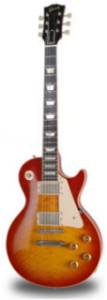 |
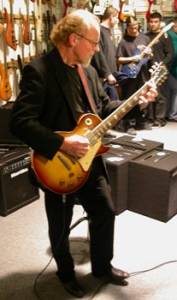 |
| Martin Barre 1962 mit seiner 1. Gibson ES 330 | Gibson Les Paul 1959 | Martin Barre mit seiner Gibson Les Paul 1959 |
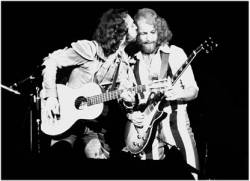 |
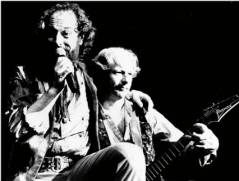 |
| Küsschen von Ian Anderson | Martin Barre spielt eine Ibanez |
Aber auch zum späten Gewinn des Grammys im Jahre 1988 für die Scheibe „Crest of a Knave“ war der Beitrag von Martin Barre nicht unerheblich. Seine knackigen Gitarrenriffs haben dazu beigetragen, der Gruppe den Preis in der Kategorie „Best Hard Rock/Metal Performance Vocal Or Instrumental“ zukommen zu lassen. Eingeweihte wissen es längst: Metallica zum Trotz!
Neben den vielen Alben mit Jethro Tull hat er inzwischen auch drei Solo-Alben eingespielt („A Trick of Memory“, „The Meeting“ und „Stage Left“) und wirkte bei unzähligen anderen Produktionen als Studiomusiker mit.
Heute nun wird Martin Lancelot Barre 60 Jahre alt. Von hieraus die besten Glückwünsche und alles Gute für die weiteren Jahre. Als alter Tull-Fan hoffe ich insbesondere, dass es eine noch lange gemeinsame Zeit mit Ian Anderson wird. Happy birthday, Martin!
Martin Barre bei wikipedia
Sicherlich eine interessante Information ist die Aussage von Martin Barre, er wäre von Leslie West von der Gruppe ‚Mountain’ beeinflusst. Hier ein Auszug aus einem Interview, das Shawn Perry mit Barre im Herbst 2003 führte (im Original):
Auszug aus: Interview mit Martin Barre (Herbst 2003) von Shawn Perry
SP: On „Count The Chickens,“ [Song von Martins CD “Stage left”] you’re playing a Les Paul Junior, which you say you bought after meeting Leslie West. You also played it on „Aqualung.“
MB: Yeah, it was the lead guitar.
SP: Would it be fair to say that some of your playing on „Aqualung“ was indirectly influenced by Mountain?
MB: I think so. Not „Aqualung“ itself, but yeah the way I play it. Leslie is the only player that I’ve actually had influence from directly. But Leslie West with his sound, he’s a great player. I didn’t try to copy him, but there are certain things about his playing that I really, really like.
SP: Correct me if I’m wrong, but doesn’t Ian usually play the acoustic guitar on Tull’s records?
MB: He normally does, but sometimes I’ll play a lead acoustic line.
SP: That being said, I think your acoustic playing on this album is very refreshing.
MB: I enjoy it. I love the acoustic sound. That’s why I’m playing bouzouki and mandolin too. The structure of the sound. I really like the sound of the guitar; you know the inversions and making an orchestral sound with the acoustic.
SP: Do you prefer the acoustic over the electric guitar?
MB: In some ways, I do because they’re so honest. You don’t get away with anything when you play the acoustic guitar. There are no sounds that mask the notes or bad technique. It’s a great, pure sound. I love it. I get a little satisfaction if I play the acoustic well to my mind. It’s very satisfying. With electric, I think you’re always fighting the elements with an electric guitar. You’re always trying to get a better sound. It’s not a perfect instrument.
…
kurze Ausschnitte aus Liedern von der Gruppe „Mountain“ (Gitarre: Leslie West) –
vom Album „The Best of Mountain“ (‚Never in My Life‘ / ‚Mississippi Queen‘ / ‚Boys in the Band‘)